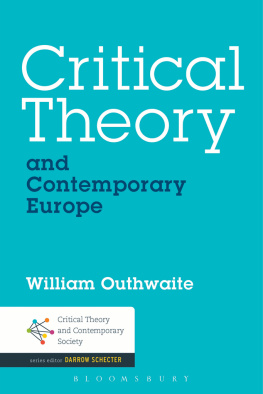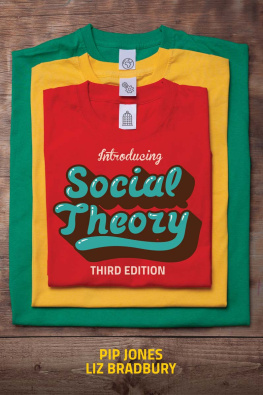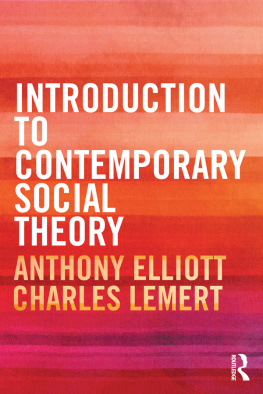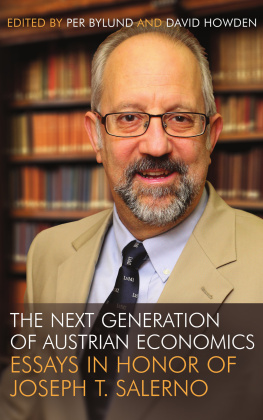First published 2013 by Pearson Education, Inc.
Published 2016 by Routledge
2 Park Square, Milton Park, Abingdon, Oxon OX14 4RN
711 Third Avenue, New York, NY 10017, USA
Routledge is an imprint of the Taylor & Francis Group, an informa business
Copyright 2013 Taylor & Francis. All rights reserved.
All rights reserved. No part of this book may be reprinted or reproduced or utilised in any form or by any electronic, mechanical, or other means, now known or hereafter invented, including photocopying and recording, or in any information storage or retrieval system, without permission in writing from the publishers.
Notice:
Product or corporate names may be trademarks or registered trademarks, and are used only for identification and explanation without intent to infringe.
Credits and acknowledgments borrowed from other sources and reproduced, with permission, in this textbook appear on appropriate page within text.
Library of Congress Cataloging-in-Publication Data
Salerno, Roger A.
Contemporary social theory / Roger Salerno.
p. cm.
Includes index.
ISBN 978-0-205-45965-0
1. Sociology. 2. Social sciencesPhilosophy. I. Title.
HM585.S25 2013
301dc23
2012001183
Cover Designer: Karen Salzbach
Cover Image: Bruce Rolff/Shutterstock
ISBN-13: 978-0-205-45965-0 (pbk)
Contemporary social theory is often looked upon by the uninitiated as a dark, confusing, even distorted rendering of an alien social landscape. Unlike classical theory that basks in the glow of Reason promoted by the European Enlightenment, this theory dwells in a shadowy placefar away from the illumination of certainty For the most part, the contemporary theory that will be presented here represents a rejection of much of what classical theorists and philosophers have taught us. That is, modern theory frequently rejects the classical notion of an objective reality, its inherent need to discover a universal truth, and its search for a natural order that governs the unified social world. Rather, it reveals a plethora of bizarre, heterogeneous, unintegrated worlds that are imaginedinto existence. These are ephemeral places in which we each live for only a moment with the hope of finding our own truthperhaps even constructing it.
Many find this new social theory confusing, even threatening. Those who subscribe to the western tradition's notion of an inherent universal truth are frequently disturbed by its implications, regardless of their political or ideological orientations. But for many others, the rich constellation of subjective analyses resonates better with their own experiences, with popular culture, and with the fleeting nature of the worlds in which they dwell for the moment. It is the purpose of this text to explore, describe, and discuss some of these new ways of understanding these strange worlds and, perhaps, to provide a roadmap through this shadowy terrain.
Contemporary Social Theoryidentifies the important intellectual movements, categories, and paradigms that have given life to many of these new ideas. In doing this, it acknowledges the movement away from Enlightment thought, which proposes a definitive center. It begins with a rendering of the emergence of this movement. It continues with a description of how social and intellectual challenges have affected the production of new theory. And it concludes with an exploration of how these theories have been applied to various social phenomena.
Theories have always emerged from the political, cultural, and social climates that produced them. They have been shaped by powerful institutional processes. At the same time, categories have been developed to encourage and perpetuate production of theory in one particular vein or another. As it exists, the current system of academic scholarship demands this. Frequently, living theorists evolve in their thinking and it is only for the sake of organizing what appearsto be distinct patterns in their work that they are grouped accordingly here and in other texts. It is the way academics contextualize and categorize social thought to make it more accessible and manageable. Whether a particular theory is considered functionalist, structuralist, poststructuralist, modern, or postmodern is frequently contentious.
One must also keep in mind that many contemporary theorists do not identify their work with any specific category of theory nor did they ever. In fact they often fail to recognize that such categories actually exist, or are important in any way. For example, Michel Foucault sometimes has been seen as a structuralist, other times as a poststructuralist, and frequently as a postmodernist. Yet, he never identified his work as fitting into any of these divisions. The quintessential postmodern theorist, Jean Baudrillard, rejected postmodernism as a category of theory altogether. And so how scholars categorize theoretical work is often quite arbitrary.
While this book recognizes that ideas often have deep histories, it also advances the view that new theory can be effectively used to assess social and cultural phenomena. Therefore, this book examines the issues that contemporary social theory is likely to confront: the postmodern condition, globalization, postcolonialism, inequality, gender, race, and human sexuality By seeing how theory is used to frame the world, we gain a better understanding of its potential application.
This text moves from presenting theoretical perspectives and their intellectual development to dealing with those specific subjects to which contemporary theory has been applied. Thus, Contemporary Social Theorycommences with a brief overview of social theory ( deal with contemporary strains of thought, which draw from these new perspectives: postmodernism, feminist theory, global studies, cultural studies, and race theory. These areas each carry a range of theoretical perspectives, and each constitutes a wellspring of current theoretical formulations.
It must also be said that contemporary theory is unsettled. It is still being interpreted and discussed. And new theories continue to emerge. Therefore, this text makes no pretense of providing the final word as to the meaning of the ideas presented; as times change theorists modify their ideas. There are new interpretations. There is also a looseness of meaning built into the theories and concepts developed by theorists we will read about that here. The porous and nebulous quality of such theory often keeps it alive. It gives the reader and critic the power to interpret itto co-construct it, if you willto give it meaning for a particular time and place in one's own life.
Something also must be said about the inability of a text like this one to include all relevant and important theorists and all of their significant ideas. Like any theory text, this is a brief survey of the field. It cannot meet the needs of everyone. However, it does attempt to provide the reader with a rich assortment and range of theoretical orientations. Its purpose is to present an accessible genealogy of what has influenced theory both intellectually and historically along the way and to demonstrate its relevance to contemporary issues. In doing this,








